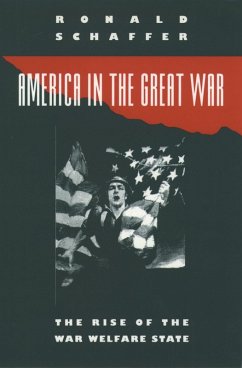After such conflicts as World War II, Vietnam, and now the Persian Gulf, the First World War seems a distant, almost ancient event. It conjures up images of trenches, horse-drawn wagons, and old-fashioned wide-brimmed helmets--a conflict closer to the Civil War than to our own time. It hardly seems an American war at all, considering we fought for scarcely over a year in a primarily European struggle. But, as Ronald Schaffer recounts in this fascinating new book, the Great War wrought a dramatic revolution in America, wrenching a diverse, unregulated, nineteenth-century society into the modern age. Ranging from the Oval Office to corporate boardroom, from the farmyard to the battlefield,
America in the Great War details a nation reshaped by the demands of total war. Schaffer shows how the Wilson Administration used persuasion, manipulation, direct control, and the cooperation of private industries and organizations to mobilize a freewheeling, individualist country. The result was a war-welfare state, imposing the federal government on almost every aspect of American life. He describes how it spread propaganda, enforced censorship, and stifled dissent. Political radicals, religious pacifists, German-Americans, even average people who voiced honest doubts about the war suffered arrest and imprisonment. The government extended its control over most of the nation's economic life through a series of new agencies--largely filled with managers from private business, who used their new positions to eliminate competition and secure other personal and corporate gains. Schaffer also details the efforts of scholars, scientists, workers, women, African- Americans, and of social, medical, and moral reformers, to use the war to advance their own agendas even as they contributed to the drive for victory. And not the least important is his account of how soldiers reacted to the reality of war--both at the front lines and at the rear--revealing what brought the doughboys to the battlefield, and how they went through not only horror and disillusionment but felt a fervent patriotism as well. Some of the upheavals Schaffer describes were fleeting--as seen in the thousands of women who had to leave their wartime jobs when the boys came home--but others meant permanent change and set precedents for such future programs as the New Deal. By showing how American life would never be the same again after the Armistice,
America in the Great War lays a new foundation for understanding both the First World War and twentieth-century America.
Dieser Download kann aus rechtlichen Gründen nur mit Rechnungsadresse in A, B, BG, CY, CZ, D, DK, EW, E, FIN, F, GR, HR, H, IRL, I, LT, L, LR, M, NL, PL, P, R, S, SLO, SK ausgeliefert werden.









